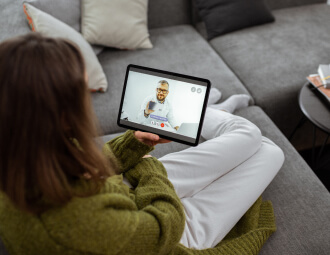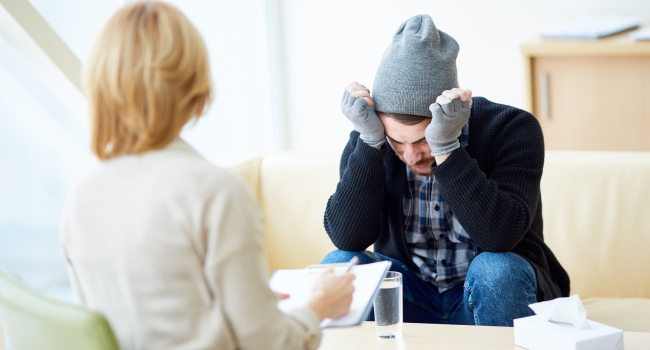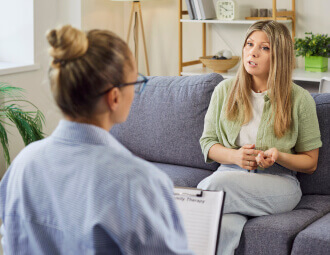Highlights
- Understanding the biology of anxiety and learning about the signs and symptoms may help you to recognize someone having this condition.
- It is always advisable for a person with anxiety to seek professional help.
- Interventions that help to calm the sympathetic nervous system might help you to comfort someone with anxiety at home.
You suspect that you know someone having anxiety, and you are very concerned. It may be a family member or loved one not dealing well with their daily life, and you’re starting to feel helpless. Anxiety disorders are the most common mental health condition worldwide, so there’s a good chance your hunch is correct. According to the
You understand that to feel anxious is expected occasionally, but when is the line crossed from being an anxious person to someone who needs help for a mental health condition or disorder? Secondly, are you able to help someone with anxiety yourself, or do they always require professional treatment? Read on to learn more about that.
Signs Someone Is Experiencing Anxiety
The first step to confirming your suspicion and understanding how to calm someone with anxiety is being able to recognize the signs and symptoms of these disorders. To do this, you need to learn why these symptoms occur.
The underlying trigger for anxiety is fear; the person feels threatened. This could be an actual or perceived danger. An example of a perceived threat could be seeing a garden hose resembling a snake or driving in a car again after a severe motor vehicle accident.
Fear is a primal response built in to protect us; that is why occasional anxiety is normal and necessary. But sometimes, this system is overly sensitive, becoming a problem.
Baseline anxiety causes
A person with anxiety might report physical or psychological
Physical Symptoms
- Racing and pounding heart or heart palpitations
- Shortness of breath
- Dizziness
- Nausea and stomach pain
- Flushing and sweating
- Tremors and shakes
- Chest tightness or chest pain
- Tingling and numbness around your lips and your fingers
- The desire to avoid eye contact
- Tiredness
- Tense muscles
Psychological Symptoms
- Excessive worry
- Excessive fear
- Invasive or obsessive thought patterns
- Poor focus and concentration
- Feeling hopeless or being overwhelmed
- Fears being in social situations and having difficulty making friends
- Thoughts of taking their own life
- Small tasks are overwhelming and become a big deal
- Low mood or depression
- Increased irritability
- Trouble sleeping
- A feeling of losing control
- Fear of dying
If you’re experiencing suicidal or self-harming thoughts and require immediate assistance, contact a crisis hotline, such as 911, 988 suicide & crisis lifeline (toll-free), or Samaritans (116-123 or via chat).
10 Tips on How to Help Someone Having Anxiety at Home
There are some tips to handle someone with anxiety during challenging moments at home with non-pharmacological interventions. These usually work by calming the sympathetic nervous system’s fight-or-flight response.
Educate Them About Anxiety
Now that you understand the biological reason they are feeling the way they are, you can explain it to them. Knowledge will make them feel more in control.
Also, provide validation for their anxious thoughts. Let your loved one know that you understand that the thoughts and feelings they are dealing with are real to them. Anxious people often feel guilty or ashamed of their emotions or reactions, and this just makes the anxious feelings spiral further.
Use Distraction Techniques
Brainstorm journaling, and balancing are great ways to distract the anxious brain from its perceived threat and focus elsewhere.
- Sit down with them, choose a topic that interests you both, brainstorm and write freely.
- Find a YouTube yoga video on tree pose and practice it for a few minutes daily.
Make Them Laugh
Even in ancient times, laughter was recognized as helping with anxiety and depression. There is a good
Limit Mobile Use
- Causing separation anxiety when the device is not around
- Being exposed to social bullying
- Being exposed to sensationalized bad news
- Viewing everyone else’s lives as “perfect” while your own is “not”
- Fear of missing out (FOMO) causes compulsive device usage and stress
Limiting the hours spent online per day may break the cycle and prevent technological addiction.
Tell Them About the Benefits of Deep Breathing
The easiest way to practice this is the 4-4-4-4 or box technique. Start by breathing in for four seconds, pausing for four seconds, breathing out for four seconds, finally pausing for four seconds, and repeating this cycle four times.

Use Music as Therapy
You’ve experienced how music can change your mood, and research shows music has been used for this purpose since World War 2. Classical music is an excellent option although everyone’s perception of relaxing or happy music varies. Ask your friend what music calms them and make them a playlist to use when anxiety occurs.
Suggest Relaxation or Imagery
Teach them this body scanning technique that fits easily into daily life and takes only five minutes:
- Start with the toes. Consciously tense them, then completely relax them.
- Next, work up the body, one part at a time, including the ankles, lower legs, knees, etc., doing the same until ending with the shoulders, neck, and jaw.
Another helpful tip is using imagination to remove their mind from their anxious reality and transport them back to a point in time when they felt utterly relaxed and content.
Do Light Exercise or Go to a Yoga Class Together
Exercise
Apply Something Hot or Cold
This doesn’t mean you should dump a bucket of cold water on your panicked friend like in the movies. Instead, an ice block or a hot water bottle on the back of the neck might be helpful.
Encourage Them to Avoid Alcohol and Caffeine
Caffeine is a stimulant and can aggravate insomnia, anxiety, and its physical symptoms; people drink coffee in the morning to get themselves going. Ironically, a person with anxiety might drink more caffeine than usual because they are tired and lack focus, but this just feeds a vicious cycle. Cutting out caffeine will decrease heart palpitations, minimize tremors, and help them to get enough sleep.
When it comes to alcohol, it
Should You Encourage Your Loved One to Get Professional Help?
Ideally, all continually anxious people should seek professional help. If your loved one is experiencing anxiety that is affecting functioning in daily life, you should prioritize getting them to a mental health professional. Depending on the results of an assessment and according to the clinician’s recommendations, it might be time to consider medication management.
Managing these conditions usually requires a
What if They Refuse Help?
You can try a few things if your friend or family member does not want to see a mental health professional.
- Set aside some dedicated time to talk to them about what you observe and why you are concerned.
- Show your support by offering to drive them to the appointment or sitting with them during the consultation.
- Refer them to resources that discuss when it is appropriate to consider consulting an MD and getting medication for managing anxiety.
Know What NOT to Do
A great way to support someone with anxiety is NOT to force them into situations that will increase their anxiety levels. For one anxious person, this might be social situations, while for another, heights or enclosed spaces might make their anxiety worse. Only a qualified therapist can use similar techniques, following approved medical guidelines.
Secondly, do not tell them to calm down or that they are being ridiculous to feel anxious about a particular situation; this will only worsen it. They feel a real threat or danger at that moment, even if it is perceived. Instead, ask them to describe their feelings and ask if there is anything you can do to help.
In Conclusion
Although the above-mentioned coping strategies may help temporarily, anxiety disorder management usually requires professional help. If your friend, family member, or loved one is experiencing this condition, prioritize getting them an appointment with a healthcare professional today.













